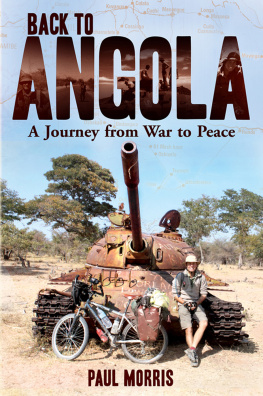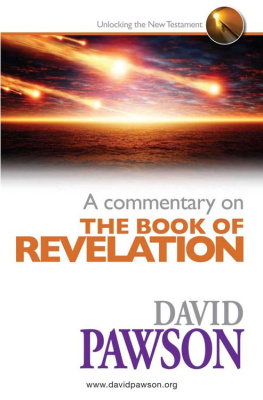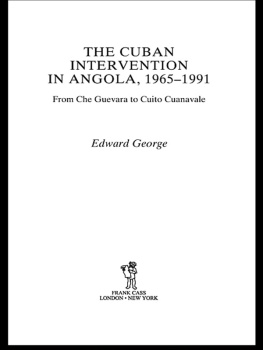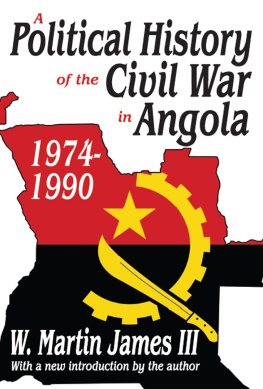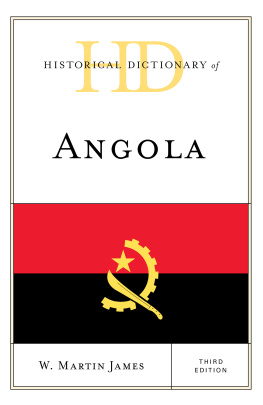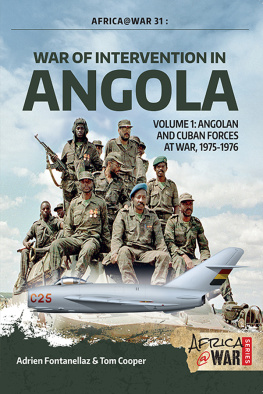Lara Pawson worked for the BBC World Service from 1998 to 2007, reporting from Mali, Ivory Coast and So Tom and Prncipe. From 1998 to 2000, she was the BBC correspondent in Angola, covering the civil war, and has returned to the country several times since. She currently works as a freelance journalist and lives in London.
With unflagging intelligence, fearlessness, and compassion, Pawson unfolds the human and political dimensions of this forgotten atrocity. She has done Angola a great service in writing this book, and all of us, Angolan or otherwise, do ourselves a great service in reading it.
Teju Cole , author of Open City
Pawson brings her sources to life like a novelist; her meetings are vivid and convincing. A simple, direct clarity of vision is brought to bear, and the reader begins to make some sense of the conspiracies and sub-conspiracies that led to the vinte e sete . By the end, Angola along with some of its layered political complexity is raw, vital, brutal and alive in front of us.
M. John Harrison , author of Climbers
In a highly readable investigation, Lara Pawson exposes not only a forgotten massacre but a cover-up, perpetrated by British journalists and historians blinded by ideology. Travelling from London to Lisbon and Luanda, she reveals new information about the role of Cuban forces in the killings, and shows how racism against black Africans lies at the heart of Angolan politics.
Lindsey Hilsum , International Editor, Channel 4 News, and author of Sandstorm: Libya in the Time of Revolution
Pawson is an investigative journalist and historical sleuth of rare candour. Her high ethical standards, probing questions, sharp critical gaze and keen observations make for a compelling text. She takes the reader in and along as she asks of herself and others difficult questions about painful times. While she had set out to discover the unwritten truth, Pawson instead unveils a still more complex landscape of memory and history, mined with silence, and knit together with complicities, stories and the underside of ideals.
Marissa Moorman , Associate Professor of African History, Indiana University and author of Intonations: A Social History of Music and Nation in Luanda, Angola, from 1945 to Recent Times
Lara Pawsons account of trying to unravel the complex knots of memory, violence, identity and politics in post-independence Angola offers a richly detailed, nuanced and emotional psychogram of a nation simultaneously fixated on and forcefully repressing its unresolved past. She vividly evokes the difficulties of doing research in and on Angola, and brilliantly captures the everyday paranoia of life in Luanda, ranging from grandiose conspiracy theories to intimate recollections of loss and the broken promises of independence.
Jon Schubert , Senior Africa Analyst, IHS Country Risk
The work that Pawson has done here is long overdue. Her starting point is that although in Angola people refer to a certain golpe (coup dtat) to justify their political indifference, there is almost nothing written about the Twenty-seventh of May. Even many British journalists, who have chronicled the process of Angolan independence since 1975, have been complicit in its silencing. My impression is that by going through these layers of silence and complicity, Pawson is asking very deep and provocative questions about the relationship between past and present in Angolan politics. There is no way politics in contemporary Angola may be understood without an engagement with the causes and the consequences of the Twenty-seventh of May.
Antnio Toms , Ray Pahl Fellow, University of Cape Town
Published in 2014 by I.B.Tauris & Co. Ltd
6 Salem Road, London W2 4BU
175 Fifth Avenue, New York NY 10010
www.ibtauris.com
Distributed in the United States and Canada
Exclusively by Palgrave Macmillan
175 Fifth Avenue, New York NY 10010
Copyright 2014 Lara Pawson
The right of Lara Pawson to be identified as the author of this work has been asserted by the author in accordance with the Copyright, Designs and Patents Act 1988.
All rights reserved. Except for brief quotations in a review, this book, or any part thereof, may not be reproduced, stored in or introduced into a retrieval system, or transmitted, in any form or by any means, electronic, mechanical, photocopying, recording or otherwise, without the prior written permission of the publisher.
ISBN: 978 1 78076 905
eISBN: 978 0 85773 470
A full CIP record for this book is available from the British Library
A full CIP record is available from the Library of Congress
Library of Congress Catalog Card Number: available
Text design, typesetting and eBook by Tetragon, London
For two who cannot be named
but know who they are thank you, so very much, for everything.
Contents
Glossary
assimilado
(lit. assimilated) A black or mestio Angolan who, under colonial rule, met the criteria for Portuguese citizenship by speaking and writing Portuguese, having gainful employment, sleeping in a bed and adhering to Christianity. Assimilados constituted under 1 per cent of the population.
bairro
(lit. neighbourhood or district) Often refers to poorer areas.
bizneiro
Slang for businessman.
bufo
(lit. wind) A spy, or informer, or someone who works for the secret police, DISA. The more metaphorical translation is a silent but deadly fart.
camarada
(lit. comrade) Usually signifies membership of or support for the MPLA.
candongueiro
A privately owned minibus. Such vehicles are used by the majority of Angolans as their day-to-day transport within and between cities.
DISA
Pronounced dee-zah. Direco de Informao e Segurana de Angola (Angolan Directorate for Information and Security).
FAPLA
Foras Armadas Populares de Libertao de Angola (Popular Armed Forces for the Liberation of Angola), the MPLA army.
FNLA
Frente Nacional de Libertao de Angola (National Front for the Liberation of Angola), one of three liberation movements that fought Portuguese colonialism, with backing from the CIA and Zaires President Mobutu Sese Seko. It drew its support mostly from northern Angola.
golpista
(lit. coupist) A Nito Alves supporter, also called a nitista and a factionalist.
kizomba
Both a popular musical genre and style of dance, performed in pairs.
Kudibanguela
(lit. We will defend ourselves) A radio programme that was banned by the government for allegedly broadcasting factionalist propaganda.
Mbundu
Angolans from the northcentral and coastal areas, who speak Kimbundu and from whom the MPLA drew much of its initial support.
mestio
(lit. mixed) Someone who has African and European ancestry, combining a black- and a white-skinned parent, two mestio parents, etc.
MPLA
Movimento Popular de Libertao de Angola (Popular Movement for the Liberation of Angola), the ruling party since independence in 1975. Initially a nationalist and socialist movement supported by the Soviet Union, East Germany and Cuba, it is now a petro-diamond-capitalist dictatorship led by President Jos Eduardo dos Santos.
musseque
Shanty town or slum.
netista
An MPLA member supporting President Agostinho Neto.
nitista
An MPLA member supporting Nito Alves.
OCA
Organizao Comunista de Angola (Communist Organisation of Angola).
Ovimbundu
Angolans from the central highlands, who speak Umbundu and who provided UNITA with much of its initial support.
PADEPA
Partido de Apoio Democrtico e Progresso de Angola (Angolan Party for Democratic Progress), a small political party that emerged in the 1990s.


